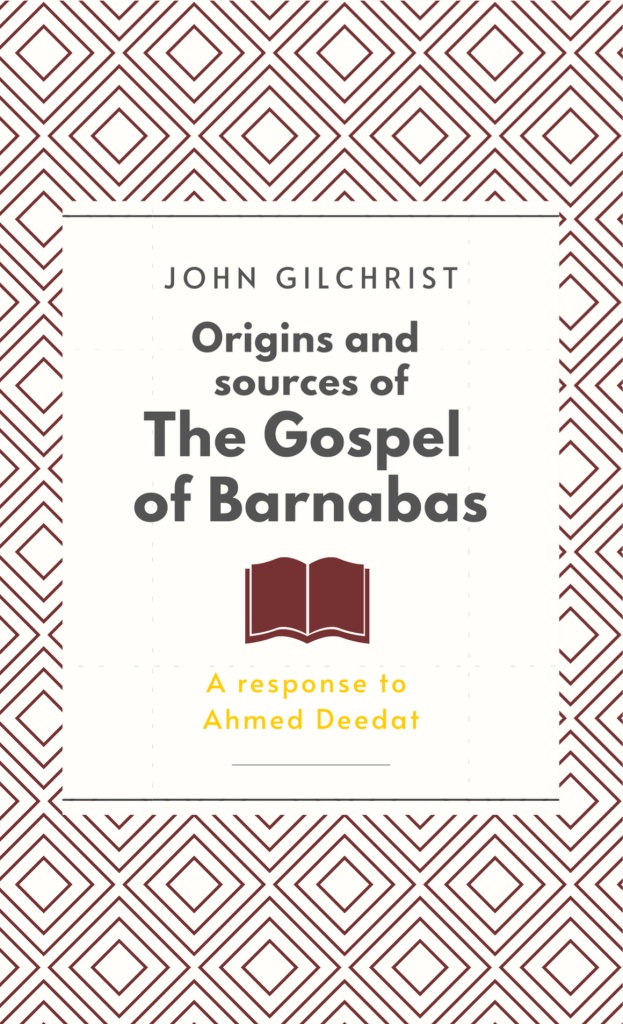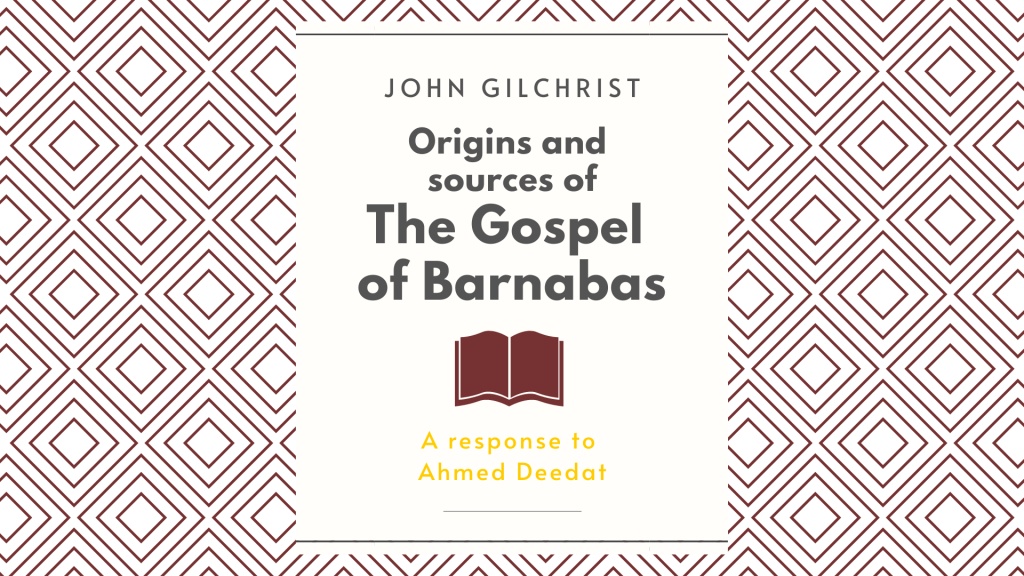Other Evidences against its Authenticity
Origins and Sources of the Gospel of Barnabas


Chapters
« Ch. 3 - Evidence of its Medieval Origin
Before concluding this booklet let us briefly consider some of the other evidences that prove that the Gospel of Barnabas is a forgery. Firstly, this book makes Jesus often state that he is not the Messiah but that Muhammad would be the Messiah. It is a constant, recurring theme in the Gospel of Barnabas. Two quotes show, not only that Jesus did not consider himself the Messiah, but preached that Muhammad was to be the Messiah:
Jesus confessed and said the truth: 'I am not the Messiah ... I am indeed sent to the house of Israel as a prophet of salvation; but after me shall come the Messiah'. (The Gospel of Barnabas, pp.54, 104).
Other passages in the Gospel of Barnabas contain similar denials by Jesus that he was the Messiah. It is clearly one of the express purposes of this book to establish Muhammad as the Messiah and to subject Jesus to him in dignity and authority. Here, however, the author of this book has overreached himself in his zeal for the cause of Islam. For the Qur'an plainly admits that Jesus is the Messiah on numerous occasions and in doing so it confirms the teaching of Jesus himself that he was indeed the Messiah (John 4:26, Matthew 16:20). One quote from the Qur'an will suffice to prove this:
'O Mary! Lo! Allah giveth thee glad tidings of a word from Him, whose name is the Messiah, Jesus son of Mary, illustrious in the world and the Hereafter'. Quran 3.45
The Gospel of Barnabas was obviously written as an ideal "Islamic" Gospel, setting forth a life of Christ in which he is made to be the Isa of the Qur'an rather than the Lord Jesus Christ of the Christian Gospels. But as it so hopelessly contradicts both the Qur'an and the Bible on the fact that Jesus was the Messiah and does this so often and so consistently, it must be rejected as a forgery by Christian and Muslim alike. There is no room here for apologetics or efforts to reconcile this book with the Qur'an or the Bible. It is a counterfeit.
Secondly, it is alleged that the Romans stirred up the Jews to such an extent about the real nature of Jesus that "all Judea was in arms" (p.115), ready to fight for or against the various beliefs being spread among them about him. As a result six hundred thousand gathered for battle - two hundred thousand each for the beliefs that he was God, that he was the Son of God, and that he was only a prophet; all of them being prepared for a three-cornered contest where each side took on the other two at one and the same time!
The story betrays itself as a phenomenal myth and fantasy by its hopeless overstatement of the number of men gathered for battle. (The author often resorts to wild exaggerations of facts and numbers in his book in an apparent attempt to create a wondrous impact on his readers). Where did the Jews suddenly find six hundred thousand swords at a time when the Romans not only suppressed but also prevented the manufacture of military hardware by this nation? Rather than fight one another, this whole army could with ease have driven the Romans right out of Palestine for the Roman army throughout the world numbered less than half this figure. Only a small garrison controlled Judea and secular history knows of no such monumental preparation for a three-cornered contest of such gigantic proportions!
The Gospel of Barnabas furthermore suggests that Pilate, Herod and Caiaphas went to great pains to prevent the pending holocaust. We find this hard to believe. If indeed the Jews were six hundred thousand strong, Pilate would have been only too delighted to see them decimate one another in a three-cornered contest!
The Gospel of Barnabas also clearly contradicts the Qur'an about the birth of Jesus when it says:
The virgin was surrounded by a light exceeding bright and brought forth her son without pain. (The Gospel of Barnabas, p.5).
This is a clear repetition of Roman Catholic beliefs of the Middle Ages. The bright light and the painless birth find parallels in the beliefs about the Virgin Mary in the churches of Europe in Mediaeval times. No such details are found in the Biblical account of the birth of Jesus but the Qur'an directly contradicts the Gospel of Barnabas when it says:
And the pangs of childbirth drove her unto the trunk of the palm tree. Quran 19.23
Because the Gospel of Barnabas purports to be an account of the life of Jesus written by one of his disciples, and further because it has been clearly composed to synchronise with the Qur'an in its concept of Jesus as a prophet of Islam, the Muslim world has not hesitated to foist this book on the Christian world as the "true Gospel". But we are constrained to ask how this book can be true in Muslim eyes if it contradicts the Qur'an which the Muslims believe to be the Word of God.
In the Gospel of Barnabas we read that Pontius Pilate was governor of Judea both at the time of the birth of Jesus (p.4) and during the time of his ministry thirty years later. Palestine was a particularly difficult trouble-spot for the Romans and no governor was sent there for long - let alone thirty years. We know from history in any event that Pilate was only appointed governor in 27 AD - more than a generation after the birth of Jesus. This is another faux pas - one of many in the pages of this Gospel.
Another contradiction between the Gospel of Barnabas and the Qur'an is found in their respective accounts of the end times. According to the Gospel of Barnabas, on the thirteenth day of a fifteen day climax leading to the end of all things, "the heaven shall be rolled up like a book, and it shall rain fire, so that every living thing shall die" (p.70). The Qur'an, however, says of the Last Day:
But when the shout cometh on the day when a man fleeth from his brother and his mother and his father and his wife and his children, every man will have that day concern enough to make him heedless of others. Quran 80.33-37
There is a clear contradiction here. The Gospel of Barnabas states that two days before the end all shall perish but the Qur'an states that men will still be alive until the last day when the trumpet shall sound from heaven. The Muslim world must choose between the Qur'an and the Gospel of Barnabas - no man can sincerely believe that the latter book is a true account of the life of Jesus Christ if he still believes that the Qur'an is the Word of God.
Furthermore according to the Gospel of Barnabas all angels shall die on the last day (p.70) but the Qur'an knows nothing of the death of angels but states that eight of them will bear the Lord's throne on the last day (Quran 69.17). Any Muslim who believes that the Qur'an is the Word of God and any Christian who believes that the Bible is the Word of God must reject the Gospel of Barnabas as a hybrid composition of no literary or religious value at all.
We could go on and produce even further proofs that this book is truly a "bare-faced forgery" as George Sale so succinctly put it but the evidence given in this booklet should be sufficient to convince any reasonable Muslim that, while he might feel it would be very useful for a Gospel to be discovered wherein Jesus foretells the coming of Muhammad, the Gospel of Barnabas just does not provide him with the honest evidence he needs. Muslim interest in this book is understandable but, in the name of truth and honesty, the Muslims of the world should admit that it is not a book contemporary with the life of Jesus, which proves that he really was the Isa of the Qur'an, but rather a lamentable forgery which, far from promoting the cause of Islam, must ultimately damage it if foolish men continue to propagate it as a true account of the life and teachings of Jesus Christ. We shall conclude with a brief study of the likely origin and author of the Gospel of Barnabas from the evidence we possess at the present time.